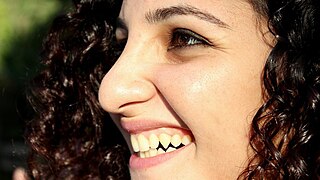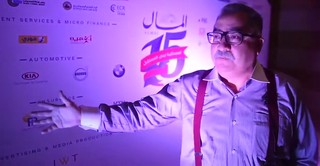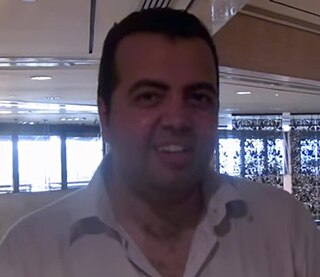Garbage Dreams is a 2009 feature length documentary film produced and directed by Mai Iskander. Filmed over the course of four years, Garbage Dreams follows three teenage boys growing up in Egypt's garbage village. Garbage Dreams aired on the PBS program Independent Lens for the occasion of Earth Day 2010 and has been screened in many international film festivals.

Tawakkol Abdel-Salam Khalid Karman is a Yemeni journalist, politician, and human rights activist. She co-founded and leads 'Women Journalists Without Chains', a group established in 2005 to advocate for press freedom and human rights. She became the international public face of the 2011 Yemeni uprising that was part of the Arab Spring movement. She was often referred as the 'Iron Woman' and the 'Mother of the Revolution" in Yemen. She is a co-recipient of the 2011 Nobel Peace Prize for "non-violent struggle for the safety of women and for women's rights to full participation in peace-building work". She became the first Yemeni, the first Arab woman, and the second Muslim woman to win a Nobel Prize.
Mary C. "Molly" Bingham is an American journalist and filmmaker.

Mona Seif is an Egyptian human rights activist known for her participation in dissident movements during and after the 2011 Egyptian revolution, for her creative use of social media in campaigns, and for her work to end military trials for civilian protesters. She is a biology graduate student, investigating the BRCA1 breast cancer gene.

Khaled Ali is an Egyptian lawyer and activist. He is known for his advocacy for reform of government and private sector corruption and for promoting social justice and labor rights. He is the former head of the Egyptian Center for Economic and Social Rights (ECESR), and co-founder of the Front for Defending Egyptian Protesters and the Hisham Mubarak Law Center (HMLC).
The Virgin, the Copts and Me is a 2011 documentary film directed by Namir Abdel Messeeh.

Ibrahim Eissa is an Egyptian journalist and TV personality best known for co-founding the popular Egyptian weekly Al-Dustour. He is currently editor-in-chief of Al Tahrir, which he co-founded in July 2011.

How to Start a Revolution is a BAFTA Scotland Award-winning British documentary film about Nobel Peace Prize nominee and political theorist Gene Sharp, described as the world's foremost scholar on nonviolent revolution. The 2011 film describes Sharp's ideas and their influence on popular uprisings around the world. Screened in cinemas and television in more than 22 countries it became popular among the Occupy Wall Street Movement. A book of the documentary, Gene Sharp: How to Start a Revolution, was released in October 2020.

Women played a variety of roles in the Arab Spring, but its impact on women and their rights is unclear. The Arab Spring was a series of demonstrations, protests, and civil wars against authoritarian regimes that started in Tunisia and spread to much of the Arab world. The leaders of Tunisia, Egypt, Libya, and Yemen were overthrown; Bahrain has experienced sustained civil disorder, and the protests in Syria have become a civil war. Other Arab countries experienced protests as well.

Mostafa Alnagar / Mostafa Alnajjarمصطفي النجار; is an Egyptian opposition figure and politician, and a writer, with a special interest in human rights.
Rapein Egypt is a criminal offense with penalties ranging from lifetime sentence to capital punishment. In Egypt, marital rape is legal. By 2008, the U.N. quoted Egypt's Interior Ministry's figure that 20,000 rapes take place every year, although according to the activist Engy Ghozlan (ECWR), rapes are 10 times higher than the stats given by Interior Ministry, making it 200,000 per year. Mona Eltahawy has also noted the same figure (200,000), and added that this was before the revolution.

Watchers of the Sky is a 2014 American documentary film directed by Edet Belzberg. The film premiered at the 2014 Sundance Film Festival on January 20, 2014 in the U.S. Documentary Competition. It won the two awards at the festival. It went on to win the Jonathan Daniels Award at the Monadnock International Film Festival and the Ostrovsky Award for Best Documentary Film at the Jerusalem Film Festival.

Maidan is a 2014 documentary film, directed by Sergei Loznitsa. It focuses on the Euromaidan movement of 2013 and 2014 in Maidan Nezalezhnosti in Ukraine's capital Kyiv. It was filmed during the protests and depicts different aspects of the revolution, from the peaceful rallies to bloody clashes between police and civilians.

Sound of Torture is a 2013 documentary film written and directed by Israeli filmmaker Keren Shayo which follows Eritrean radio host and human rights activist Meron Estefanos as she reports on Eritrean refugees who have been captured in Sudan while migrating across the Sinai Peninsula into Israel.
Ayten Amin is an Egyptian film director, writer, and producer. She began her career making documentary films during the Egyptian Revolution of 2011 and is best known for Souad, Villa 69, and Tahrir 2011: The Good, the Bad, and the Politician
Eliane Raheb is a documentary filmmaker and director from Lebanon. She made her debut as a director with her 2012 film, Layali Bala Noom. Her latest film is Miguel's War from 2021. That film received the Teddy Award for best LGBTW film at the 2021 Berlin International Film Festival.

The Edge of Democracy is a 2019 Brazilian documentary film directed by Petra Costa. The film follows the political past of the filmmaker in a personal way, in context with the first term of President Lula and the events leading to the impeachment of Dilma Rousseff, analyzing the rise and fall of both presidents as well as the 2014 socio-political crisis that swept Brazil. The arrest of Lula paved the way for Jair Bolsonaro's 2018 campaign and presidency. It had its world premiere at the 2019 Sundance Film Festival and was released by Netflix on June 19, 2019. It was nominated for Best Documentary Feature at the 92nd Academy Awards and won a Peabody Award in 2020.
Cinema of Sudan refers to both the history and present of the making or screening of films in cinemas or film festivals, as well as to the persons involved in this form of audiovisual culture of the Sudan and its history from the late nineteenth century onwards. It began with cinematography during the British colonial presence in 1897 and developed along with advances in film technology during the twentieth century.
Jeff Kaufman is an American film producer, director, writer, and artist. Kaufman has produced, written, and directed documentaries focusing on human rights activism and cultural icons including The State of Marriage, Every Act of Life, and Nasrin.

A la calle is a 2020 documentary film directed by Maxx Caicedo and Nelson G. Navarrete. The documentary focuses on the crisis in Venezuela, the 2017 Venezuelan protests and the Venezuelan presidential crisis.












